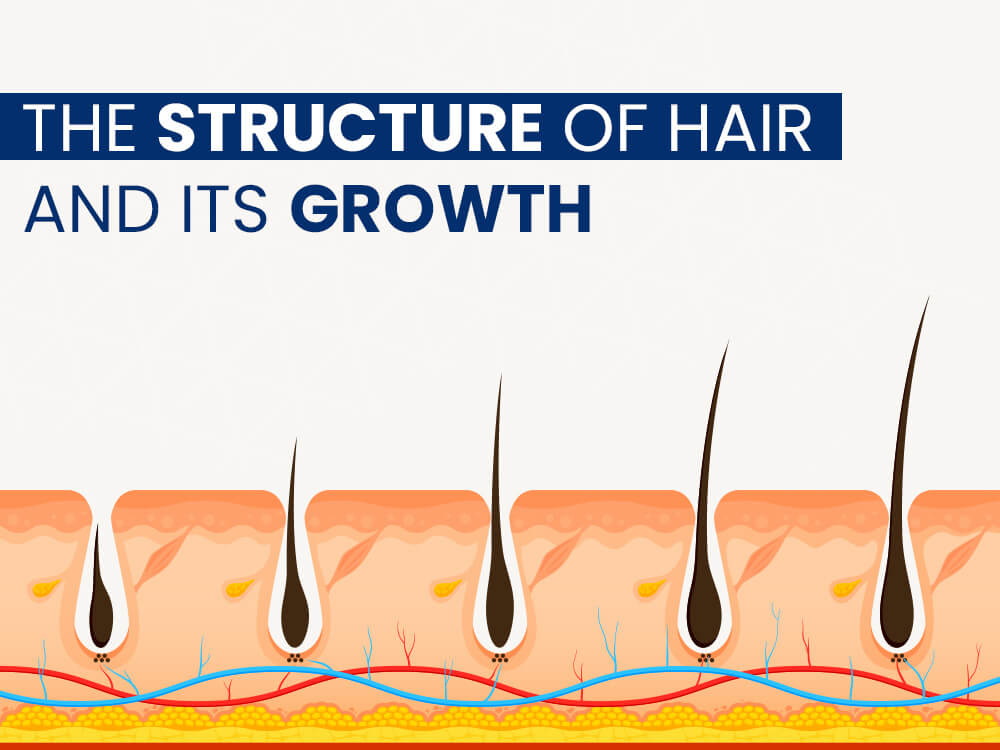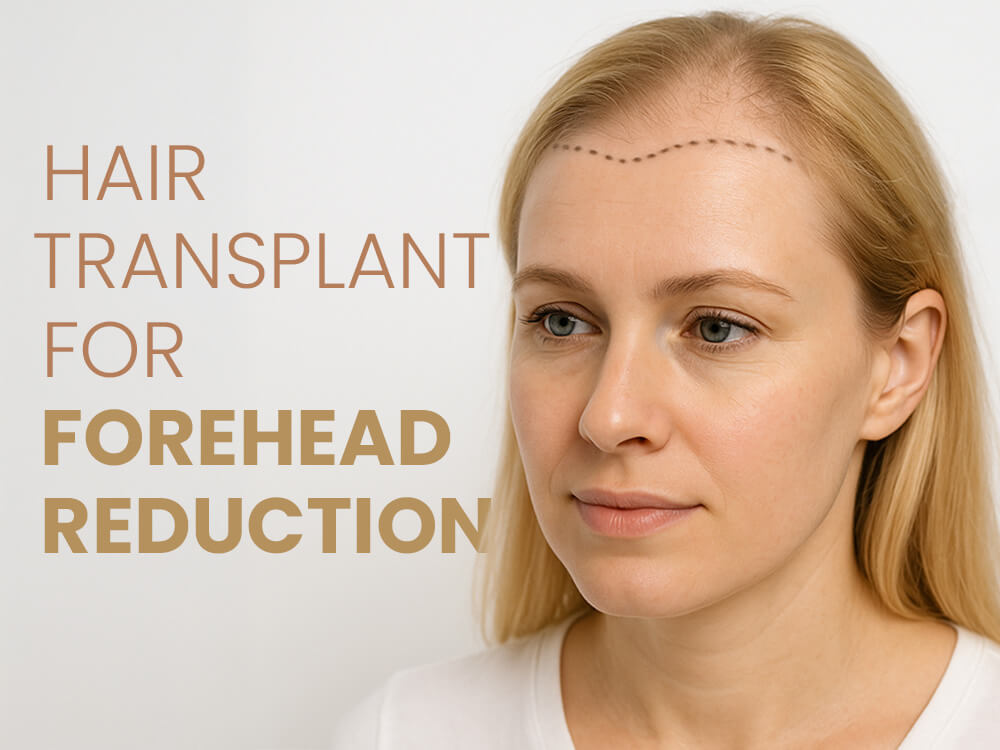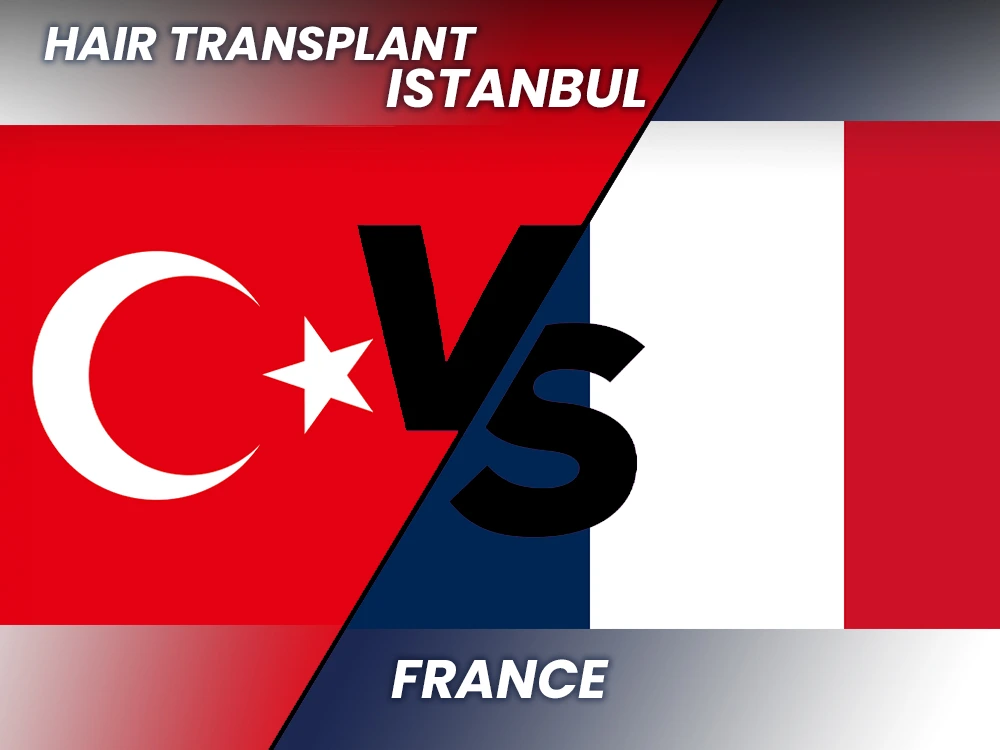



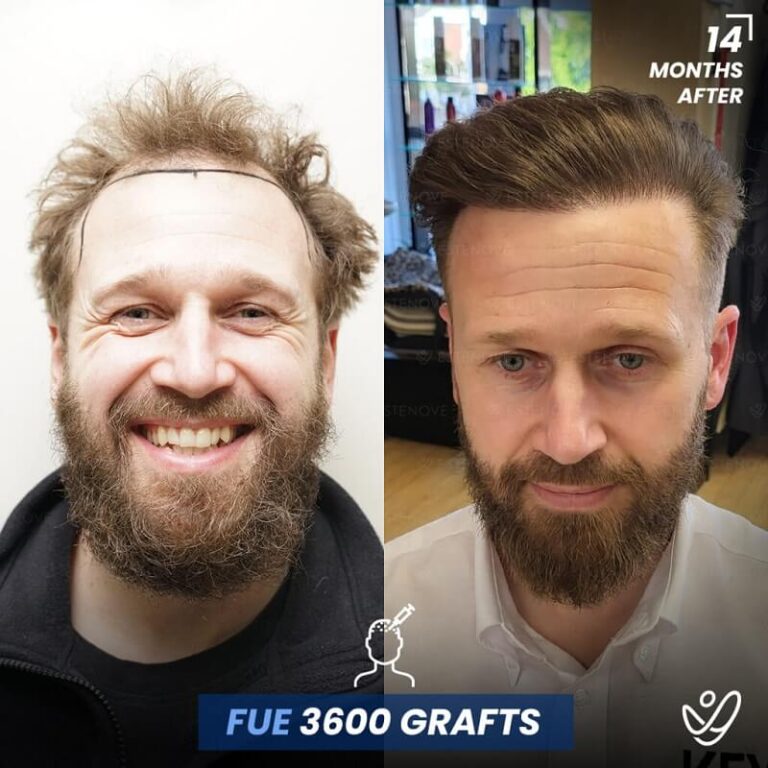


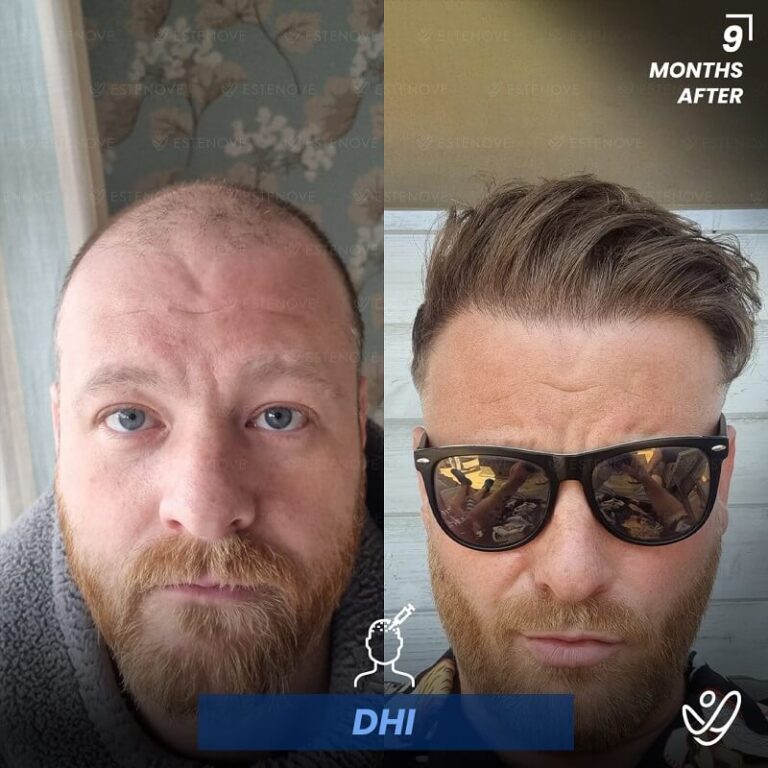






CBS Inside Edition featured our clinic as part of their special episode on Hair Transplant Turkey on hair transplantation and medical tourism! This episode follows the personal story of our patient Dr. Joseph Hummel in Estenove and his hair transplant journey.

Explore real-life hair transplant success stories featuring detailed videos, before-and-after photos, and insights into operation types and procedures.
We are partnered with 5-star hotels located within the area where the treatments will take place.
Hair transplant cost includes all transfers between airport, hotel and hospital.
Your dedicated professional translator will be available to you for 24-hours every day.
Medicines, creams and special shampoos, are all included in one professional medical pack.
Our partnerships with experienced and reputable surgeons offer one of the best hair transplant treatments in Turkey at an affordable price. With our free consultations prior to the procedure, you can obtain an accurate outlook of the likely results and how they match up to your desired outcome. Check out some of the patients’ hair transplant reviews.
Hair transplants in Turkey typically cost between $2,800 and $4,500 for up to 4,000 grafts. That’s often less than half the price you’d pay in Western Europe or North America, and in some cases, even a third.
Most Turkish surgeons perform 500+ transplants each year, using advanced techniques like FUE, DHI, and needle-free anesthesia. Their experience leads to higher graft survival rates and more natural results.
Packages often include everything: 4-5 star hotel stay, airport transfers, translator, medications, and aftercare -eliminating surprise costs and making the entire process seamless for international patients.
Top clinics in Turkey operate at EU-level hygiene and safety standards, using cutting-edge tools like Sapphire blades and DHI pens to ensure comfort, precision, and lasting results.
Estenove provides international services with an experienced team and the most up-to-date technologies in Istanbul. You can have the healthy hair of your dreams if you join us. If you want to get more information about hair transplantation, you can get support from an expert consultant.
All of the hair transplant operations at Estenove are performed in Istanbul, Turkey, under supervision of our partnered award winning private hospitals and highly trained doctors and staff. Treatments are carried out at contracted healthcare institutions with a health tourism authorization certificate.

Estenove’s Partner Hospital
Got questions about hair transplants? We’ve got you covered! Explore the answers to all your common questions—not just about the procedure, but also about costs, travel, and accommodation.
Turkey’s popularity for hair loss treatments stems from its extensive experience in successfully performing these procedures. The country is renowned for its use of the Follicular Unit Extraction (FUE) technique, which is less invasive than other methods. Additionally, Turkey is a favored destination for medical tourism, attracting many patients seeking affordable yet high-quality hair transplant services. In 2022, around 1 million individuals traveled to Turkey for hair transplants, collectively spending about $2 billion, according to the Turkish Health Tourism Association.
The cost of a hair transplant in Turkey typically ranges from $1,400 to $9,000 depending on various factors such as the number of grafts needed and the complexity of the procedure. This significant cost difference is primarily due to the lower cost of living and overhead expenses in Turkey. If you would like to learn more, check out hair transplant costs in Turkey.
Turkey boasts a lower cost of living than most of the countries like Germany, US or UK, resulting in reduced operational expenses for hair transplant clinics. Secondly, the country is home to numerous highly skilled and experienced hair transplant surgeons who offer their services at more affordable rates than counterparts in other regions. Lastly, Turkey’s streamlined medical procedures entail less bureaucratic hurdles, further diminishing the operational costs of hair transplant clinics. Visit our guide on hair transplant cost in Turkey for detailed information.
Yes, hair transplants are a safe in Turkey if you choose the right clinic. First of all, hair transplant clinics in Turkey have state-of-the-art technology, a high level of knowledge, more experienced surgeons, and staff than the aesthetic health markets in other countries. When evaluating a clinic, consider:
If you have any other concerns feel free to check out our patients video testimonies on our youtube channel, view success stories or read some of our most recent reviews.
Yes, it’s a fantastic opportunity to get a hair transplant in Istanbul, Turkey. Not only cost of hair transplant in Turkey is cheaper than getting a hair transplant in the USA, UK, or Australia, but it’s also extremely safe. Turkish aesthetic clinics have a record of providing safe and successful treatments for the last decade. Estenove has provided thousands of patients with a new hairline and outlook on life. With a success rate greater than 95% you can count on EsteNove to give you best care available if you choose to visit Turkey.
Anyone can have a hair transplant at anytime. However, winter time is a popular time for patients to have a hair transplant as there is less heat and sun exposure than during the summer time. If you would rather avoid a busy clinic, then summer might be the right choice for your appointment date.
At Estenove we recommend to have a consultation and book your appointment at a minimum of 1-2 months ahead. There isn’t any particular time of year to have a hair transplant either. Check out for more info at When is the Best Time of Year for a Hair Transplant in Istanbul?
Patients need to stay in Istanbul for 3 days for hair transplant:
Day 1: Come to Istanbul, Turkey. Then be transported to your hotel.
Day 2: Examination and Hair transplant surgery is performed
Day 3: Hair washing after the transplant surgery and patient return back to his / her country. (In addition, PRP treatment is performed as well as reception of your after care products)
The best way to get a hair transplant in Turkey is to look around for the highest rated clinics on google. After choosing a couple clinics that you think you would like, you should set up a consultation appointment with each of them. You will learn what treatment type is best for you, how much coverage you will need, what’s included in each clinic’s packages, and how much it will cost. You can then select which clinic best suits your financial and medical needs. Hopefully, Estenove will be the right choice for you.
Client satisfaction is very important to us. So we provide accommodation, VIP car transfers that include airport pick up and hotel-clinic transportation for our hair transplant patients who come from out of town or abroad. In addition to that, we provide translators for our international patients.
There are a few ways you can get in contact with us and a medical consultant. You can leave us your contact information via our website form, our social media, or send us an e-mail. Then one of our medical consultants will contact you for some photographs of your current hair and our doctor analyze them and send you a treatment plan and estimate.
Estenove’s top priorities are patient satisfaction and safety. Estenove offers solutions tailored to the needs of patients in line with a fully personalized service approach, providing satisfactory and permanent results that provide a natural look. We will never recommend a hair transplant to patients who are not suitable for treatment.
Yes, we give a guarantee for post-operative results, with the exception of hair loss or failed growth caused by other health conditions or therapies that cause patients additional hair loss. In addition, patients should also follow the post-operative instructions given by the doctor.
Before a hair transplant, the patient should consider the nature of the surgery and surgical risk factors. Also, it is important to ensure that hair transplant is the best decision for your hair loss problem. Patients should consider the hair transplant technique that will be used for their operation, the surgeon’s experience, hair transplant clinic reliability, and of course the cost of surgery and transportation to Istanbul, Turkey.
The duration of a hair transplant procedure varies depending on the technique used and the number of grafts required, typically ranging from 5 to 8 hours. Use our graft calculator to estimate the number of grafts and sessions needed for your operation.
Yes, the hair transplant procedure is done under local anesthesia.
As Estenove, we use Comfort-In technology which is one of the latest methods of local anesthesia. With this needle-free technology, we minimize the amount of pain during and after the operation. Visit painless hair transplant page for more information.
With the Sapphire FUE method, special sapphire tips are used to open microchannels in the receiving area. With these special inserts, it is possible to open smaller and more sensitive channels for implantation. In this way, more dense hair transplantation is achieved creating a more natural look. In addition to that, in the Sapphire FUE method, scarring is minimized and the healing process becomes shorter after hair transplant surgery and patients can quickly return to their daily lives.
Platelet-rich plasma (PRP) is a treatment that is performed by using the patient’s own blood to assist in healing and increasing the immune response to targeted areas of the body. In PRP therapy, the plasma from the blood of the patient is separated using a centrifuge. The plasma separated from the blood is rich in platelets which are responsible for inducing clotting to stop bleeding and to help signal an immune response to increase the rate of recovery. The resulting PRP is injected into the scalp and hair follicles with a syringe. It is also applied to people who have hair loss, but not enough level for hair transplant.
Its main purpose in hair transplantation is as a post-operative method used to accelerate wound healing and hair growth after the hair transplant operation. For more visit What Is PRP Hair Treatment?
Whether a person is a good candidate for a hair transplant procedure is determined through a professional consultation and analysis from one of our doctors. This includes examination of (hair tissue, hair follicle quality, hair density, elasticity, pores, and skin texture). In this respect, after considering all factors such as patients state of health, the viability of the donor area and the width of the area to be transplanted, it is understood whether a person is suitable for hair transplant.
The amount of grafts the patient needs depends on the degree of hair loss and the density that the patient desires. You can estimate the number of grafts needed for your hair transplant via our graft calculator.
After contacting Estenove, on the diagnosis report that’s prepared by our physician, the number of grafts needed will be decided. The average hair transplant takes approximately 3000-5000 grafts. At Estenove, we don’t charge per graft, instead you’ll receive the maximum number of grafts necessary for your treatment.
Hair transplants can safely be performed on anyone from 22 to 65 years of age. But we cannot say, all people in this age range can have a hair transplant. Hair type, hair loss conditions and other general health condition of the patient may affect their ability to get a hair transplant.
It is completely dependant on which method of treatment your doctor recommends is best for you. In the FUE technique, it is recommended to shave the donor area and the recipient area. In the DHI method the donor area needs to be shaved but the recipient area doesn’t have to be shave but it makes it easier for the surgeon to perform the procedure if it is shaved.
Yes, you need to stop taking drugs, especially blood thinners, before the hair transplant surgery. Also, you should stop taking, depression medications, painkillers, vitamin E and B drugs, food supplements, herbal remedies, and multivitamins. It is important to check with your primary or family care doctor if it is safe to stop using certain medications for the procedure.
Alcohol consumption and smoking must cease approximately 1 week before the hair transplant surgery.
